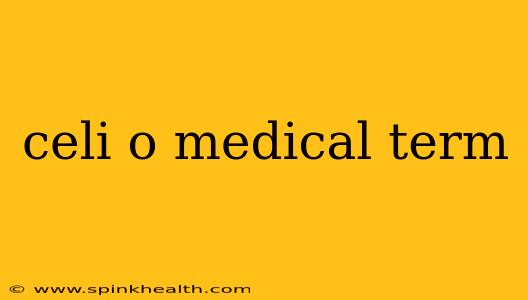Celiac disease. The term itself might sound daunting, but understanding its meaning and implications is crucial for anyone affected by this autoimmune disorder, or for those simply seeking knowledge about it. This isn't just a medical term; it's a label for a complex condition impacting millions worldwide. Let's unravel the mystery surrounding "celiac disease" and explore its multifaceted nature.
Imagine a world where something as simple as eating bread could trigger a cascade of adverse reactions in your body. For those with celiac disease, this is sadly their reality. It's a lifelong condition where the ingestion of gluten, a protein found in wheat, barley, and rye, triggers an immune response that damages the small intestine. This damage hinders the absorption of essential nutrients, leading to a wide array of symptoms and long-term health complications.
What Exactly Does "Celiac" Mean?
The word "celiac" originates from the Greek word "koilia," meaning "belly" or "abdomen." This etymology hints at the disease's primary manifestation—its impact on the digestive system. However, it's far more than just a tummy ache. The immune response initiated by gluten isn't confined to the gut; it can affect various parts of the body, highlighting the systemic nature of this condition.
What are the Symptoms of Celiac Disease?
The symptoms of celiac disease are incredibly diverse, making diagnosis challenging. Some individuals experience severe gastrointestinal distress, while others present with subtle, seemingly unrelated symptoms. This broad spectrum of manifestations is a key reason why celiac disease often goes undiagnosed for years, sometimes even decades.
What are the common digestive symptoms of celiac disease?
This is a frequently asked question, and rightly so. Common digestive symptoms include chronic diarrhea, bloating, abdominal pain, gas, and weight loss. However, it's crucial to note that these symptoms can also be indicative of other conditions. The unique aspect of celiac disease lies in its association with gluten ingestion and the subsequent immune-mediated damage to the intestinal lining.
What are some non-digestive symptoms of celiac disease?
Many people don't realize that celiac disease can manifest beyond the gastrointestinal tract. Non-digestive symptoms can include fatigue, anemia, skin rashes (dermatitis herpetiformis), neurological problems, and even infertility. The breadth of these symptoms often leads to misdiagnosis and delays in proper treatment. This highlights the importance of a comprehensive diagnostic approach when suspecting celiac disease.
How is celiac disease diagnosed?
Diagnosing celiac disease involves a combination of tests. Blood tests can detect the presence of antibodies related to the immune response against gluten. However, a definitive diagnosis often requires an endoscopy with a small intestinal biopsy to visualize the damage to the intestinal lining. This procedure allows doctors to assess the extent of the damage and confirm the diagnosis.
What is the treatment for celiac disease?
The cornerstone of celiac disease treatment is a strict, lifelong gluten-free diet. This means eliminating all sources of wheat, barley, and rye from the diet. This dietary change isn't merely a lifestyle modification; it's a necessity for managing the disease and preventing long-term complications. While initially challenging, following a gluten-free diet is achievable with careful planning, education, and support.
Living with Celiac Disease: Navigating a Gluten-Free Life
Living with celiac disease demands meticulous attention to diet and lifestyle. It requires a conscious effort to read food labels, avoid cross-contamination, and seek out gluten-free alternatives. This can be challenging in a society where gluten is pervasive in many foods. However, with the right knowledge, support, and resources, individuals with celiac disease can lead full and healthy lives.
The "celiac" in "celiac disease" is not just a medical term; it represents a significant challenge, a lifelong commitment to careful dietary management, and a testament to the human body's complex interaction with its environment. Understanding this term empowers individuals to seek appropriate care, manage their condition effectively, and live healthier, more fulfilling lives.

